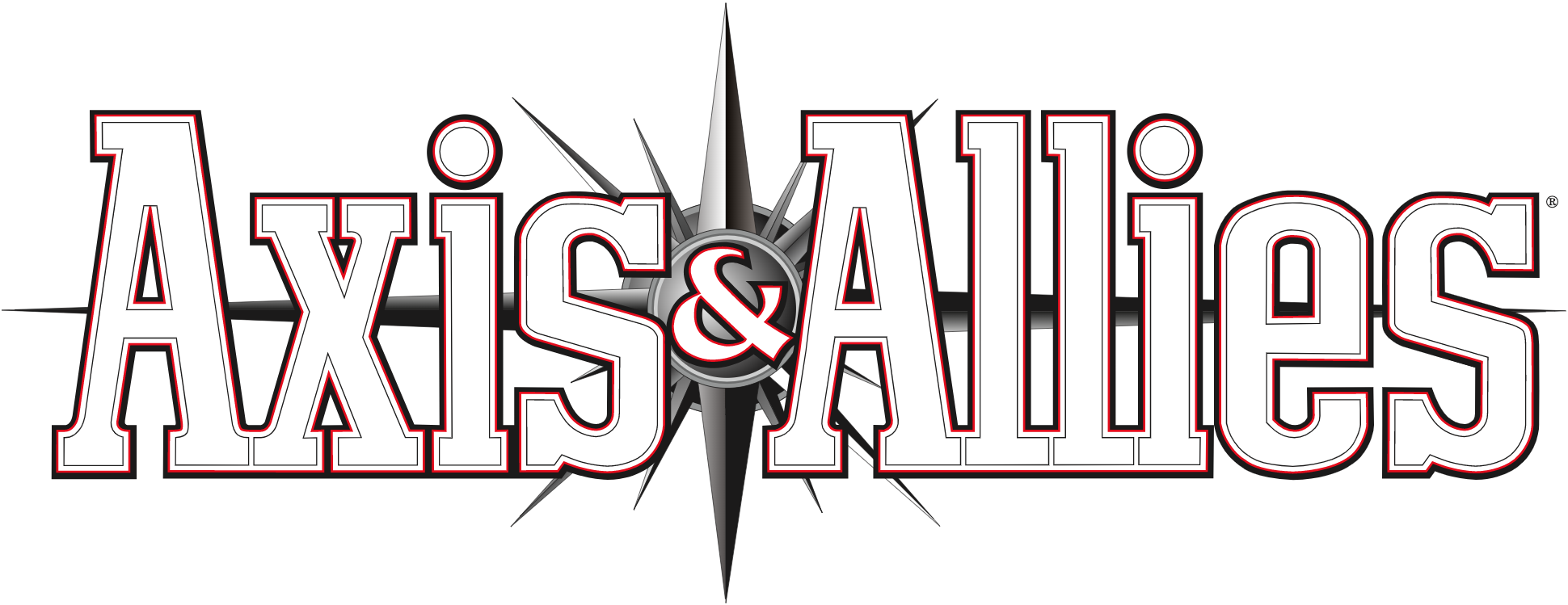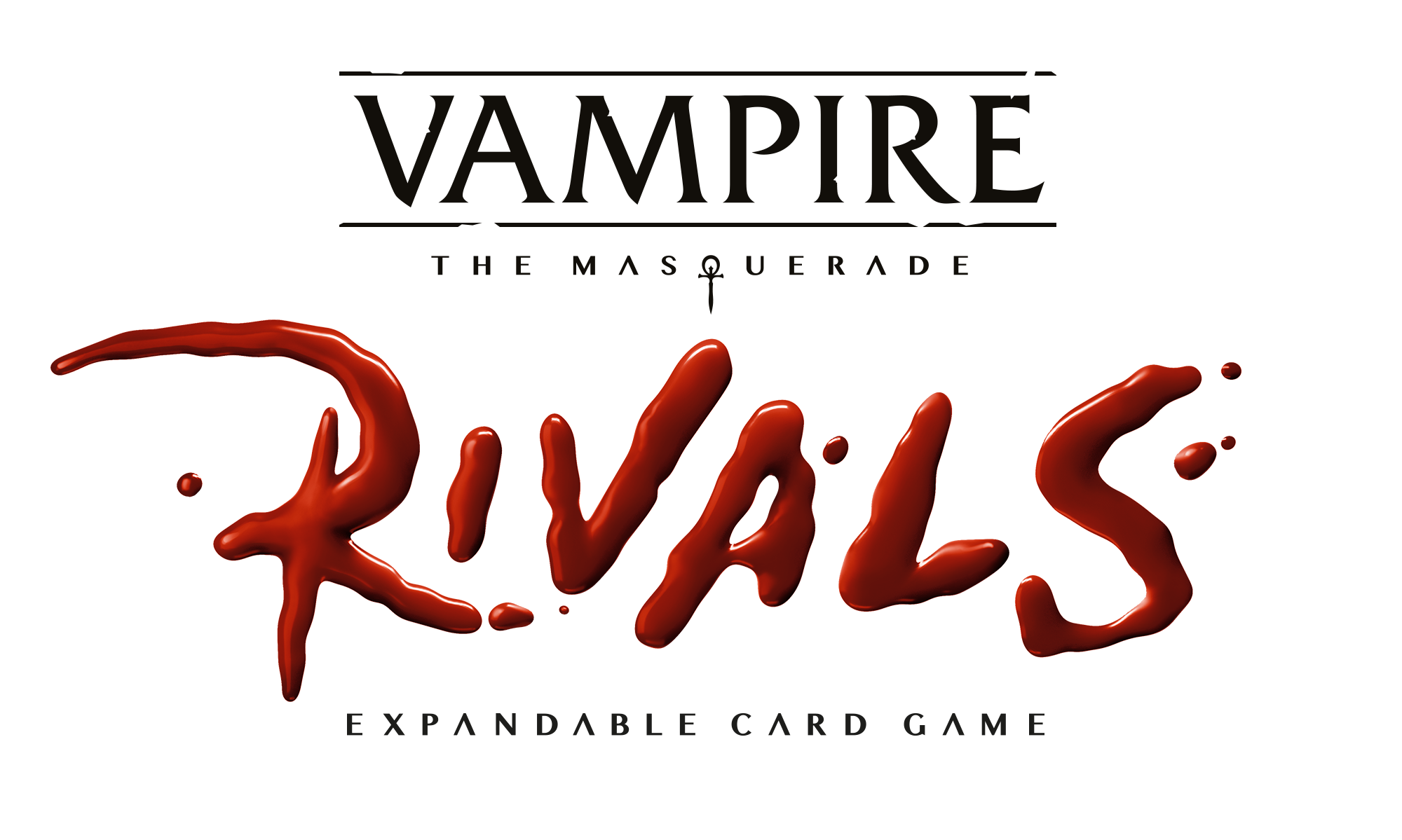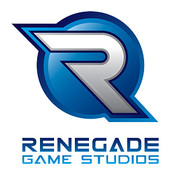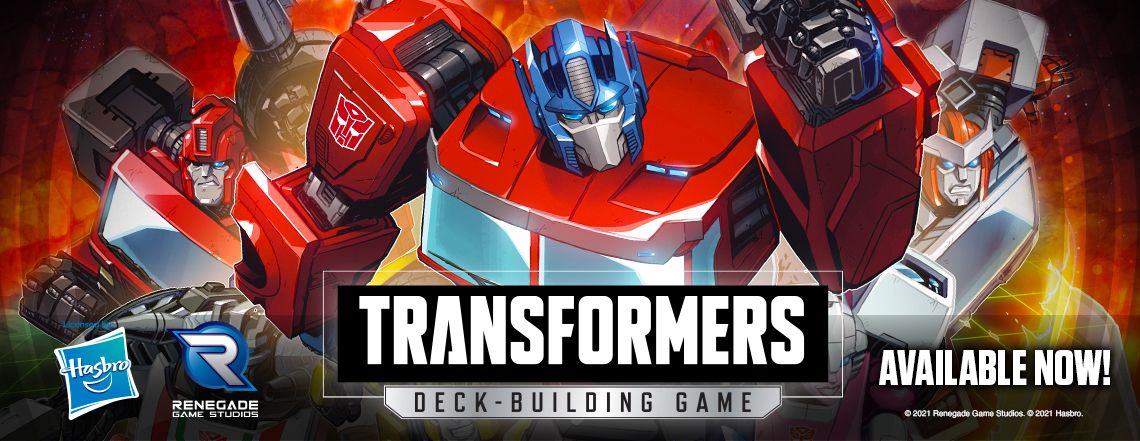Transformers Deck-Building Game - Assists and Damage
Posted by Renegade Game Studios on Sep 13th 2022
The Transformers Deck-Building Game is a game with several very detailed mechanics. While this makes for a very strategic, engaging, interactive game, it also increases the learning curve of the game. One particular mechanic is the interaction between Damage and Assists when Battling or Confronting Adversaries. This article will break down these two concepts and examine how they fit together.
Assists allow non-active players to contribute power to a battle started by the active player in order to increase the chance of success, and to share in the rewards of success. All players whose Assists are resolved during a successful battle will receive the full reward listed at the bottom of the Adversary's card, same as the active player; however, the active player also gets to place the Adversary in their Vault for end-of-game scoring which still gives them a slight advantage in Competitive Mode. Assists may be played during any battle in Cooperative Mode and any number of those Assists may be resolved, since you want as much help from your teammates as possible, but in Competitive Mode, Assists may only be played during battles where the active player controls Damage or during any Confrontation, and only until there is enough Power to defeat the Adversary.
In the second step of battle, starting after the active player and proceeding clockwise around the table, each player has the opportunity to place a single card from their hand face down in front of them as an Assist, but may choose to pass*. A valid Assist card must have sufficient Range to reach the Adversary's space and must have or be able to generate at least 1 Power.
Be careful, though! Your Alt Mode may reduce the Power of cards played during battles. For example, if Arcee is in Alt Mode when she plays Hound as an Assist, then the -1 Power from her Alt Mode will negate the 1 Power provided by Hound. She will have to activate the Energon ability to gain +2 Power in order for the card to be a valid Assist. Alternatively, she can spend 1 Energon at any point before resolving the Assist in order to Convert.
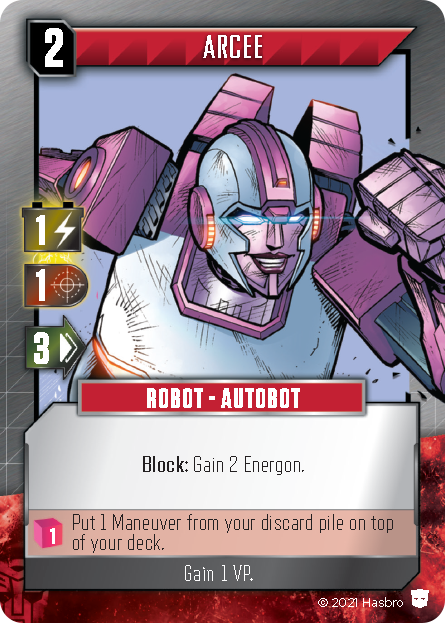
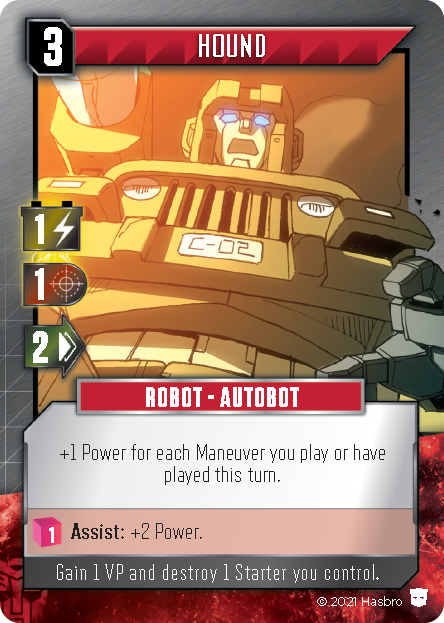
Once all players have had a chance to play an Assist, if no Assists have been played, the active player may choose to change their mind and decline to battle; however, if even one Assist has been played, then the battle must proceed. For Confrontations, shuffle the Encounter cards and then draw one and resolve the Boss Confrontation text at this point. Next, if the battle is a Confrontation and the amount of Power provided by the active player is not enough to defeat the Adversary, then the active player must choose Assists to resolve, one at a time in any order, until they collectively have sufficient Power to defeat the Adversary, at which point all other Assists go unresolved and the battle is concluded.
When an Assist is resolved, its player reveals it and puts it into play. Only the Power and Range are available on the Assist, including any text or ability which modifies the Power or has the Assist keyword. All Assists, whether resolved or not, are discarded at the end of the battle. If the active player controls any Damage, they may be forced to accept Assists from players. This will be covered in a bit.
Many deck-building games have a "dead" card that can be added to your deck throughout the game, with the purpose of clogging up your deck and possibly providing a negative effect to navigate. In Transformers Deck-Building Game, this card is the Basic card, Damage, though it doesn't go into your deck (yet!**). When you gain Damage, typically from an Encounter card or Boss, it is put in play in front of you, and remains there until it is repaired or otherwise removed. Being in the play area, Damage cards are controlled by the player.
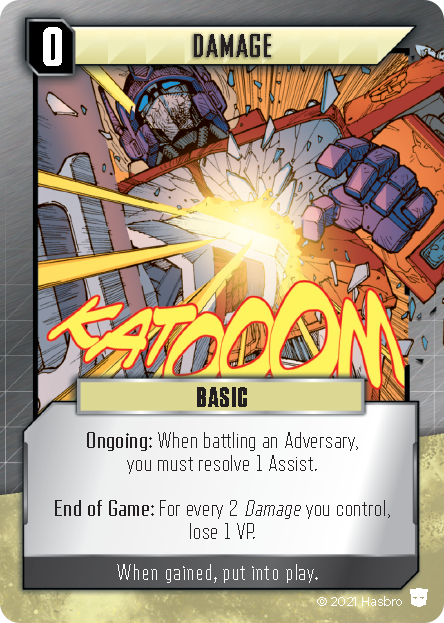
Ongoing: When battling an Adversary, you must resolve 1 Assist.
End of Game: For every 2 Damage you control, lose 1 VP.
Damage has two effects when controlled by a player which vary slightly depending on the game mode being played. One effect impacts the end of game: in Competitive Mode, the controlling player lose one Victory Points for each pair of Damage cards they control at the end of the game; whereas in Cooperative Mode, controlling 5 or more Damage cards will end the game. The other effect forces the active player to accept Assists from other players during battle in Competitive mode.
When battling in Competitive Mode, controlling Damage means the active player is injured and must accept help from their competitors whether they want it or not. In addition, if the active player controls Damage when they battle a non-Boss Adversary, then other players are now able to Assist.
During a Competitive Mode battle in which the active player controls Damage, players are given the opportunity to provide Assists, as described above. If any Assists were played, then some or all of them must be resolved according to the amount of Damage controlled by the active player. For each Damage controlled by the active player, 1 Assist of their choice must be resolved, if possible. Here are a few different scenarios.
1) No Assists are played
If there are No Assists, then the active player is off the hook. The requirement has been met as much as it
can be and the battle may continue as normal.
2) Fewer Assists than Damage or Assists equal to Damage
In this case, the active player has no choice but to resolve all the Assists in
whichever order they choose. After all
Assists have been resolved, the remainder of the battle may proceed.
3) More Assists than Damage
The active player selects Assists to resolve, one at a time in any order, until
they have met the required number due to Damage. If the battle is against an Adversary Robot,
then the remaining Assists are not resolved and are discarded, and the battle
continues to its resolution. In a
Confrontation, after resolving Assists due to Damage, if the amount of Power is
greater than or equal to the Adversary's cost (including any bonus from a
Confrontation Encounter Card), then no more Assists can be resolved and the
battle concludes. If the amount of Power
is still less than the Adversary's cost, then the active player must continue
to resolve Assists until they have enough Power, or until they run out of
Assists.
It's important to note that Damage does not prevent players from battling. It does not mean the battle cannot happen without the right number of Assists. Rather, it is a requirement to resolve as many as possible. Whether the active player has Damage or not, battles will still progress as they normally would (with the exception of Assists being allowed on non-Boss Adversaries). The only difference is that, with Damage, when it comes time to resolve Assists, the active player is being forced to accept some or all of the Assists.
While Assists are always helpful for defeating Adversaries, being forced to resolve Assists due to Damage in any competitive mode can cause a shift in points at an inopportune time. Be sure to stock up on ways to remove Damage, either by returning them to the stack or by destroying them (eg: Repair Bay or Fix). Happy hunting!
*if the battle is not a Confrontation and the active player controls no Damage, then other players are not allowed to Assist and the Assist step will be skipped. This will help keep the game moving smoothly.
**future expansions will have different Damage cards, which may go into your discard pile as in other deck-building games, and may have effects other than forcing Assists to be accepted. These may be required to be played if in your hand.
New to the deck-building scene? Start with the base game!
Been playing the Transformers Deck-Building Game for a while? Level up your play experience with the expansions! We have the newly released A Rising Darkness expansion, and the upcoming Infiltration Protocol and Dawn of the Dinobots expansions!
Article Credit: Eric Findlay

